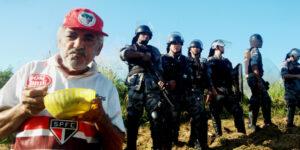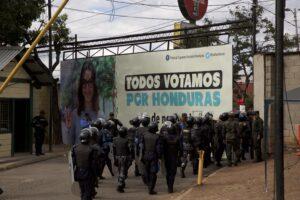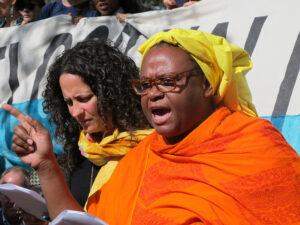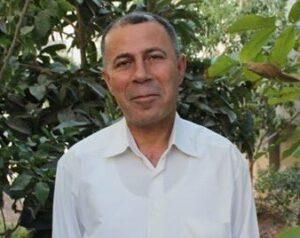Imprisoned: Inside the Politics of Control and Resistance
The rise of destructive and reactionary political power impacts people and ecosystems across many global settings. These shifts in control, characterized by a resurgence of racist and nationalistic rhetoric and policies, a redoubling of environmental exploitation and even climate change denial, and a renewed expansion into and pillaging of Indigenous territory, represent urgent challenges for social movements and activists. Although these contemporary pressing issues have some distinctive new features, they are rooted in past forms of injustice, whether that be borrowing from the colonial playbook or amplifying the privatization schemes of the more recent neoliberalism, such as free trade and deregulation.
At the same time, these are precisely the dynamics that cultivate resistance. Social justice movements from around the world are pushing back against this shift toward nationalism, extraction and environmental destruction. They are particularly highlighting food sovereignty, feminism, and environmental justice as strategic ways forward in the defense of land, water, and territory.
Those who take on these essential tasks increasingly do so at risk of great personal harm, arrest and indefinite jailing as political prisoners, or the criminalization of their movements as a whole. Even so, the resistance not only remains steadfast, but is also gaining strength, in places as diverse as Brazil, Honduras, and Palestine—countries featuring violent, conservative, reactionary and acquisitive governments.
Power Grabs in Brazil
Gaining political control starts with power grabbing—a concept to which the sprawling country of Brazil is no stranger. Power grabbing in the form of smashing intricate peasant leagues occurred during the military dictatorship, and it continues to this day. Most recently, the parliamentary coup that ousted a democratically elected president and relegated authority to an unelected and corrupt right wing was the ultimate seizure of power.
Under such corruption and disregard for democratic processes, social movements suffer even more intense criminalization. This has often included the preemptive imprisonment and even assassination of peasant and indigenous leaders, most notably those connected to Grassroots International’s partner the Landless Workers Movement (MST) that is arguably the largest and most important state-level peoples’ movement in the Americas.
Nearly twenty-two years ago in April 1996, 19 activists from the MST were killed by the Brazilian military police in what would come to be known as the Eldorado dos Carajás massacre. The murders were carried out at the height of the trends of neoliberalism and globalization that Brazil was warmly and widely embracing throughout the 1990s, while strangulating its most rural, vulnerable, and Indigenous citizens in favor of corporate expansion and the country’s emergence as a major actor on the world stage.
 Now more than two decades after the massacre, the Brazilian government tends to treat activism—especially that which takes place in the countryside—as criminal activity. The same April week in 2017 that the commemorations for Eldorado dos Carajás took place, nine rural squatters were brutally murdered. And in September 2017, gold miners reportedly killed some 10 members of an ‘uncontacted’ Indigenous group in the Amazon. Mining in Brazil, much like logging, is strongly opposed by peasant and Indigenous movements as one of the greatest threats to the world’s largest rainforest while championed by the powerful nexus of state, business, and lobbies.
Now more than two decades after the massacre, the Brazilian government tends to treat activism—especially that which takes place in the countryside—as criminal activity. The same April week in 2017 that the commemorations for Eldorado dos Carajás took place, nine rural squatters were brutally murdered. And in September 2017, gold miners reportedly killed some 10 members of an ‘uncontacted’ Indigenous group in the Amazon. Mining in Brazil, much like logging, is strongly opposed by peasant and Indigenous movements as one of the greatest threats to the world’s largest rainforest while championed by the powerful nexus of state, business, and lobbies.
These massive power grabs contextualized within a definitive push for rightwing exclusionary populism have spelled trouble for seekers of social justice. The MST as a whole is increasingly criminalized, and its members imprisoned. This is due in large part to the peasant movement’s relentless efforts towards agrarian reform, for which its activists can be arrested without evidence.
In November of 2016, police armed with assault weapons stormed MST’s well known Florestan Fernandes national school that provides political and agroecological training for activists from around Brazil and the world. In a coordinated arrest, police withdrew and detained two people from the school, and raided the homes of MST leaders elsewhere in the country that same day. This became known as Operation Castra, and was quickly denounced by human rights organizations. Under the pressure that ensued, Brazil released the activists six months later in May of 2017.
Resource Grabs in Honduras
Power grabbing is indeed oftentimes connected to resource grabbing, yet another piece of the overall political dynamics of control. Although resource grabbing, in the form of taking away peoples’ rights to water and land, have been fixtures of injustice for centuries, this phenomenon has recently taken new shapes under globalization. More specifically, powerful states and their militaries tend to prey on the weak points of former colonies for their own financial and political gains. As the case of Honduras warns us, when intertwined with power grabs, resource grabs become even more deadly—especially for those who resist.

Today, Honduras is still in limbo after what were allegedly rigged elections. The Honduran people have made no secret of their distaste for the kinds of U.S.-backed politicking that has spilled blood in their country for decades. Organized by the hundreds of thousands, they have done so in the streets, and they have done so at the polls. But in Honduras, the electoral system is tied to resource control at the hands of state elites and transnational corporations, as well as direct political intervention from the north.
The notorious 2009 coup in Honduras unleashed an unprecedented surge in natural resource grabs, marketed as an ‘open for business plan’ to satisfy the components of neoliberal and militarized models of development favored by the new U.S.-backed government. Massive land transfers have taken place to make way for megaprojects such as dams, mining, roads, tourism, agribusiness, and climate change mitigation schemes.
Honduras, however, has vast alliances—peasant, environmental, feminist, LGBTQ, Indigenous, Garífuna (Afro-Indigenous), and labor struggles—that engage in multiple forms of resistance, from land occupations to human rights documentation to interfacing with the state. The criminalization of these movements and imprisonment of activists is routine.

In Garífuna communities along Central America’s Caribbean coast, Grassroots International’s partner the Black Fraternal Organization of Honduras (OFRANEH) has been at the forefront of resistance to what has become an attack on their ancestral resources and cultural identity from all sides: sea, water, land, and forest. OFRANEH uses organizing tactics from community radio broadcasts to land occupations, all of which the government has noted and responded to with violence. The group’s leaders face threats or instances of imprisonment on falsified charges on a daily basis. OFRANEH’s vice president Alfredo López spent six years in prison before finally being released for ‘lack of evidence’ and intense international pressure in 2015. Miriam Miranda, OFRANEH’s coordinator and a well-respected feminist has also been imprisoned for her political organizing that has spanned more than 25 years and receives numerous death threats.
Causing even greater alarm, the blatant assassination of human rights defenders and movement leaders has recently become commonplace. A report released earlier this year found that Honduras is the deadliest country in the world for environmental activists, with 120 having been killed since 2010. The 2016 murder of Berta Cáceres, the co-founder of the Civic Council of Popular and Indigenous Organizations of Honduras (COPINH) brought widespread attention to this situation. COPINH organizes Indigenous Lenca communities for territory rights, the defense of rivers, and of Mother Earth.
Control Grabs in Palestine
In Palestine, power grabs and resource grabs have resulted in the ultimate manifestation of enclosure—control grabbing. First by British Empire, and then by Israeli occupation, Palestinians have been continually squeezed out of their homeland, and those who remain are subject to various forms of violence and discrimination.
The current hardline political climate in Israel has increased the Israeli government’s stronghold on Palestinian lands. This amounts to territorial restructuring in the forms of illegal settlement expansion and transfer of Israeli citizens into occupied Palestinian territory, in the case of the West Bank, and increasing restricted access zones and militarized attacks, in the case of the Gaza Strip. These and other forms of control perpetrated by the Israeli occupation are likewise made possible and maintained through outside military and financial support.
The most notable example is the U.S. administration’s unfaltering support of Israel at the cost of Palestinian human rights and regional stability in the Middle East. Its latest iteration came in December 2017 when the U.S. administration took rogue politics to the next level by unilaterally announcing Jerusalem to be Israel’s capital, a reckless move that threatens to unravel what is left of a peace process that has constantly sidelined Palestinians and deprived them of their most basic rights.
Palestinian human rights defenders and social movements pose one of the biggest threats to maintaining and proliferating the occupation, a fact that has not been lost on the Israeli government. The result has been a trend of mass incarceration, including administrative detention, where people are held in prison for months or even years without charge or trial, supposedly because of ‘secret evidence.’ The Prisoner Support and Human Rights Association in Palestine, Addameer found that as of July 2017, 449 Palestinians were being held without trial or even charge. It concluded that “the conditions and procedures that the occupation authority is using in administrative detention violate International Conventions and other international standards for the right to a fair trial.”
 One such political prisoner held without charge is Abdul-Razeq Farraj, a leader in Grassroots International’s partner the Union of Agricultural Works Committees (UAWC). Farraj has spent more than 16 combined years in Israeli prisons, most of them under administrative detention. Most recently, he was wrested from his home and family at midnight on May 24, 2017, and has been held without cause ever since. Abdul-Razeq’s work with UAWC has been focused on improving the lives of Palestinian farmers, whose suffering is in large part due to confiscation of land and water resources and repression under Israeli occupation.
One such political prisoner held without charge is Abdul-Razeq Farraj, a leader in Grassroots International’s partner the Union of Agricultural Works Committees (UAWC). Farraj has spent more than 16 combined years in Israeli prisons, most of them under administrative detention. Most recently, he was wrested from his home and family at midnight on May 24, 2017, and has been held without cause ever since. Abdul-Razeq’s work with UAWC has been focused on improving the lives of Palestinian farmers, whose suffering is in large part due to confiscation of land and water resources and repression under Israeli occupation.
Palestinian women and children are also regularly imprisoned as a mechanism of control. Khalida Jarrar, a prominent leftist member of the Palestinian Legislative Council and herself an organizer and prisoners’ rights activist, was jailed in the summer for a six-month administrative detention sentence which can be renewed indefinitely. Out of resistance to these practices, Palestinian political prisoners organize periodic hunger strikes. In the early part of 2017, some 1,500 Palestinians held in Israeli jails fasted for 40 days, demanding adequate medical care, fewer restrictions on family visits, and end to both administrative detention and solitary confinement.
Grabbing Back
The struggles in Brazil, Honduras, and Palestine are indicative of politics of control—and resistance—that are happening all over the world. In Brazil, a newly emerged international force, the coup government has chosen corporate-driven economic growth, privatization, and corrupt politics through power grabbing rather than respect for democratic processes and the well-being of its low-income populations, particularly peasants and indigenous peoples. Honduras, a fragile state in the wake of a coup, bears the scars of external influence, whether that be military, corporate, or electoral, and these wounds are most pronounced in the form of unchecked natural resource grabbing. And in occupied Palestine, one of the world’s few remaining colonial projects continues with no end in sight; in the absence of statehood or any meaningful form of political sovereignty, the Israeli occupation has become the extreme expression of control grabbing. In each of these cases, oppressive states and business interests use a variety of tools of repression, from criminalization and the creation of political prisoners to physical threats and assassinations.
Winning back sovereignty and achieving justice are the political tasks at hand in these and other cases around the world, and ones that movements and activists take seriously—no matter how high the stakes. From Brazilian mass movement building to pinpoint alternatives and retain the countryside, to Honduran reclamation of natural resources through food sovereignty, agroecology, and climate justice, to relentless Palestinian efforts of upholding international law and defending human rights, people are challenging destructive political orders. Doing so is a collective act of resilience and resistance, ‘grabbing back’ in order to move forward in uncertain times.

